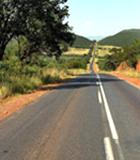
After some lively debate, Chardonnay and pouring over maps, we decided to head out north on the N7, and to venture off the highway whenever the mood took us. Within a week we were packed and heading out in an ancient station wagon loaded with camping gear, olives and dubious wine. The West Coast is South Africa's Wild West – it has a long, proud history of luring desperados and fortune hunters to its wild and windswept shores. It seemed perfect.
We had decided to start in Eland's Bay, a small, dusty town with a load of street cred. The town has long been a Mecca for surfers, because when the wave works, delighted goofy footers will tell you, it breaks big and it breaks fast. Now you would imagine it would be easy to find – I mean if all those ashenhaired surfers can get there, it must be pretty elementary – but we found ourselves wheeling around the hillside town of Piketberg unable to find the turn-off.
Eventually we wandered into the police station and, in broken Afrikaans, asked a stout, busty policewoman to show us the way. Pointing down the road, she directed us, in an amazing, rolling Swartland accent, to 'rrry tot dood teen die berg, en dan rrry, en rrry, en rrry' (Drive until dead against the mountain and then drive, and drive, and drive).
Which we did, and we got there. The town in Eland's Bay is basic and a tad shabby, but this is not the attraction. The setting is beautiful, the mountain crashes down to the sea, bright fishing boats bob on turquoise water and on the still water of its lagoon you can be treated to flocks of cerise-winged flamingos. After a few days of walks, sundowners and wind-blasted meals in the seaside campsite, we took to the road to Lambert's Bay. When you read that Lambert's Bay's primary industrial activities include fishing and guano collection (over 300 tons a year), you may wonder what we were doing there, but for bird enthusiasts, Lambert's Bay is a treat.
Depending on the time of year, there can be between 20 and 30 000 birds roosting on Bird Island and swirling in the air like confetti. And it's here that the first boma-style outdoor fish restaurant started. Born out of beach braais for family and friends, the Muisbosskerm, five kilometres south of town, is right on the beach and offers course after course of fish, mussels, meat, the West Coast speciality, bokkoms, and even crayfish when in season.
Back on the road we headed inland, passing through Clanwilliam to Wupperthal, which had intrigued us. Three dry and dusty mountain passes into the Cederberg Mountains, Wupperthal was established a century-and-a-half ago as a Rhenish and later a Moravian mission station, and has a reputation of being trapped in time. Approaching the town in the late afternoon, we had a startling experience.
We were driving along a dirt road when we swung around a corner and suddenly a massive black eagle rose from the road and swept over the car, its wings spanning the windscreen and blacking out the light before it soared into the air. 'Jislaaik', we said, staring wild-eyed at each other. Its complete eclipsing of the light and deadly hanging talons were breathtaking.
Our next port of call we chose simply because it was obscurely named and a long way off the highway. Hondeklip Bay – so named for the dog-like rock on the edge of town – is so remote that water is delivered by a big truck and not piped into the town. There is nothing in particular to do there, but we enjoyed the sweep of beach, chilly rock pools and roaming around the graveyard to glean some of the history of the town. Our last stop was Port Nolloth, which sprang up in 1926 with the discovery of alluvial diamonds and which still draws diamond seekers and those looking to purchase the glittering rocks illegally. Unfortunately our arrival at the Port Nolloth campsite coincided with the Christmas braai of a local police station. The men were most enthused to find three girls tumbling out of a car; we were rather less so.
After some sustained effort on their part to get our attention, we pleaded with the tannie in reception to move us to a different site in the hope of peace. I'd like to report that we had a peaceful sleep, but deep in the night some pranksters snuck up to our tent and whipped out all the tent pegs, leaving us squirming around like larvae under the canvas. We spent the rest of the night in the car and hit the road in the morning, ready to tackle life in the city again.
For more info, contact…
Image by: ALAN MURDOCH/ Die Burger




 Publications
Publications
 Partners
Partners










